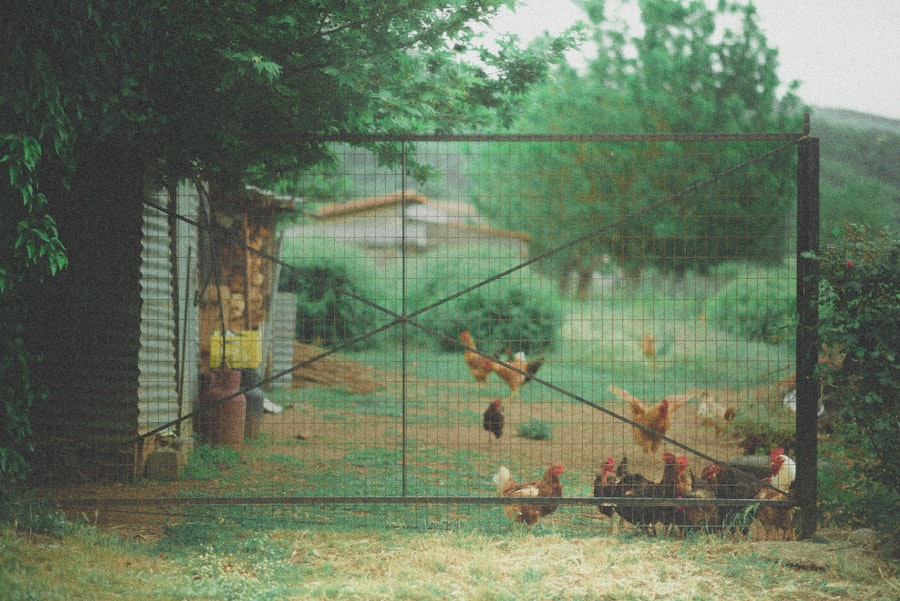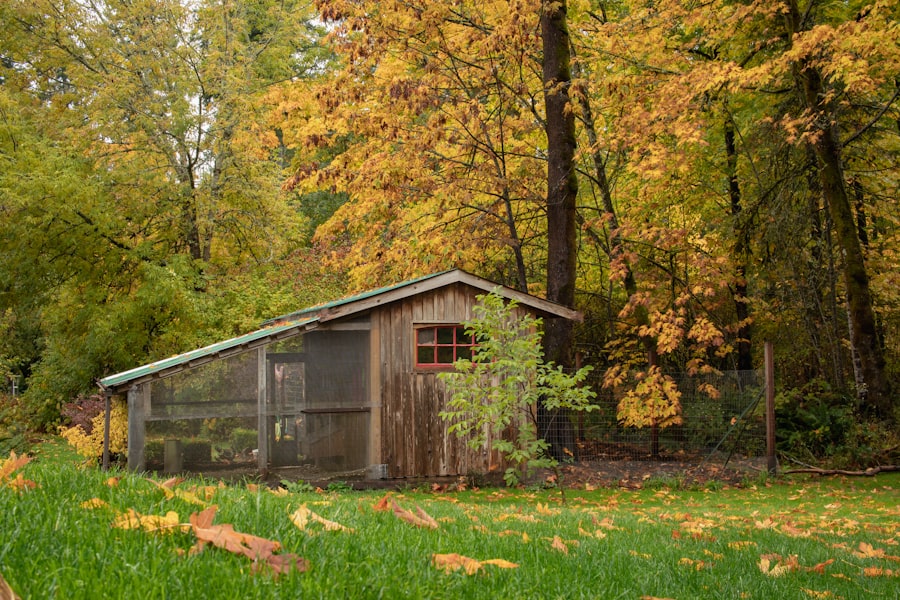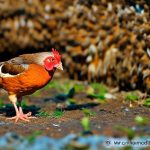Lice infestation is a prevalent issue affecting both backyard and commercial chicken flocks. Lice are small, wingless insects that inhabit the skin and feathers of chickens, feeding on their blood. Two primary types of lice infest chickens: biting lice, which consume skin and feathers, and sucking lice, which feed on blood.
Lice infestations can cause various problems for chickens, including irritation, discomfort, and reduced egg production. In severe cases, infestations may lead to anemia and mortality. Lice populations tend to increase during warmer months, and chickens kept in crowded or unsanitary conditions are more susceptible to infestations.
Introducing new birds to an existing flock can also result in lice infestations if the new chickens are carriers. Chicken owners must be vigilant and proactive in preventing and managing lice infestations to ensure the health and well-being of their birds. To effectively manage lice infestations, chicken owners should be able to identify symptoms, implement preventative measures, and know how to treat and manage infestations.
This includes understanding how to recognize signs of infestation, employing natural remedies, maintaining regular cleaning practices, quarantining and treating infected birds, and seeking professional help for severe cases.
Table of Contents
- 1 Identifying Symptoms of Lice Infestation in Chickens
- 2 Preventative Measures to Keep Lice Off Chickens
- 3 Natural Remedies for Lice Infestation in Chickens
- 4 Regular Maintenance and Cleaning to Prevent Lice Infestation
- 5 Quarantine and Treatment for Infected Chickens
- 6 Seeking Professional Help for Severe Lice Infestations in Chickens
- 7 FAQs
- 7.1 What are lice and why are they a problem for chickens?
- 7.2 How can I prevent lice infestations in my chicken coop?
- 7.3 What are some natural remedies for keeping lice off chickens?
- 7.4 How often should I inspect my chickens for lice?
- 7.5 Can lice infestations in chickens be treated with medication?
Key Takeaways
- Lice infestation is a common problem in chickens and can cause discomfort and health issues.
- Symptoms of lice infestation in chickens include feather loss, irritation, and visible lice eggs or insects.
- Preventative measures to keep lice off chickens include regular cleaning, dust baths, and providing a clean living environment.
- Natural remedies for lice infestation in chickens include diatomaceous earth, herbal sprays, and essential oils.
- Regular maintenance and cleaning of the chicken coop and surrounding areas is essential to prevent lice infestation.
Identifying Symptoms of Lice Infestation in Chickens
Common Signs of Lice Infestation
One of the most common signs of lice infestation is excessive preening and scratching. Chickens that are infested with lice will often spend a lot of time grooming themselves and scratching at their feathers in an attempt to alleviate the irritation caused by the lice. Additionally, chickens with lice may exhibit restlessness and agitation, as well as a decrease in egg production. The feathers of infested chickens may also appear dull, dirty, or matted, and the skin underneath may be red and irritated.
Severe Consequences of Lice Infestations
In severe cases, lice infestations can lead to anemia, weight loss, and even death in chickens. It is essential for chicken owners to take lice infestations seriously and take prompt action to prevent the spread of lice and manage infestations in their flocks.
Inspecting for Lice and Nits
Another way to identify lice infestations in chickens is to inspect their feathers and skin for the presence of lice or their eggs (nits). Lice eggs are small, white or yellowish specks that are typically found attached to the base of the feathers near the skin. Adult lice are small, flat insects that are pale in color and can often be seen moving around on the skin or feathers of infested chickens.
Prevention and Management
It is crucial for chicken owners to regularly inspect their birds for signs of lice infestation, especially during the warmer months when lice populations tend to increase. By being vigilant and proactive in identifying lice infestations, chicken owners can take the necessary steps to prevent the spread of lice and effectively manage infestations in their flocks.
Preventative Measures to Keep Lice Off Chickens

Preventing lice infestations in chickens is key to maintaining the health and well-being of poultry flocks. There are several preventative measures that chicken owners can take to keep lice off their birds. One of the most important preventative measures is to maintain a clean and sanitary coop environment.
Regularly cleaning and disinfecting the coop, nesting boxes, and roosts can help to reduce the risk of lice infestations by eliminating potential breeding grounds for lice. Additionally, providing chickens with access to dust baths can help to naturally control lice populations. Dust baths allow chickens to coat themselves in fine dust or sand, which suffocates and kills lice and other external parasites.
Another important preventative measure is to practice good biosecurity when introducing new chickens to an existing flock. New birds should be quarantined for a period of time before being introduced to the main flock to prevent the spread of lice and other parasites. Additionally, regularly inspecting new birds for signs of lice before introducing them to the flock can help to prevent the introduction of lice into the coop.
Finally, providing chickens with a balanced diet and ensuring that they have access to clean water and adequate space can help to boost their immune systems and make them less susceptible to lice infestations. By taking these preventative measures, chicken owners can help to keep lice off their birds and reduce the risk of infestations in their flocks.
Natural Remedies for Lice Infestation in Chickens
When it comes to treating lice infestations in chickens, there are several natural remedies that chicken owners can use to effectively manage infestations without resorting to chemical treatments. One natural remedy for lice infestation is diatomaceous earth, which is a fine powder made from the fossilized remains of diatoms. Diatomaceous earth works by dehydrating and killing lice and other external parasites on contact.
Chicken owners can dust their birds with diatomaceous earth or sprinkle it in their coop bedding to help control lice populations. Additionally, adding garlic or apple cider vinegar to chickens’ drinking water can help to make their blood less palatable to lice, which can reduce the risk of infestations. Another natural remedy for lice infestation is neem oil, which is derived from the seeds of the neem tree.
Neem oil has insecticidal properties and can be used to treat lice infestations in chickens. Chicken owners can dilute neem oil with water and spray it directly onto their birds’ feathers and skin to help control lice populations. Additionally, planting herbs such as mint, lavender, and oregano near the coop can help to repel lice and other external parasites.
These herbs contain natural compounds that are known to have insecticidal properties and can help to keep lice off chickens. By using these natural remedies, chicken owners can effectively manage lice infestations in their flocks without exposing their birds to potentially harmful chemicals.
Regular Maintenance and Cleaning to Prevent Lice Infestation
Regular maintenance and cleaning of the coop and surrounding areas are essential for preventing lice infestations in chickens. Keeping a clean coop environment is one of the most effective ways to reduce the risk of lice infestations by eliminating potential breeding grounds for lice. Chicken owners should regularly clean out the coop bedding, nesting boxes, and roosts, and disinfect these areas with a poultry-safe disinfectant to kill any remaining lice or eggs.
Additionally, removing any debris or clutter from around the coop can help to reduce hiding places for lice and other external parasites. In addition to regular cleaning, providing chickens with access to dust baths can help to naturally control lice populations. Dust baths allow chickens to coat themselves in fine dust or sand, which suffocates and kills lice and other external parasites.
Chicken owners can create a dust bath area by filling a shallow container with sand or fine dust and placing it in the coop or run for their birds to use. By providing chickens with access to dust baths and maintaining a clean coop environment, chicken owners can help to prevent lice infestations and keep their flocks healthy and comfortable.
Quarantine and Treatment for Infected Chickens

Quarantine and Isolation
Infected chickens should be quarantined from the rest of the flock in a separate area with clean bedding and access to food and water. This will help to prevent the spread of lice to other birds while allowing infected chickens to be treated effectively.
Cleaning and Disinfecting
Additionally, all equipment used by infected birds should be thoroughly cleaned and disinfected to prevent the spread of lice within the coop.
Treatment Options
There are several treatment options available for managing lice infestations in chickens. In addition to natural remedies such as diatomaceous earth and neem oil, there are also commercial poultry dusts and sprays that can be used to treat lice infestations. These products should be used according to the manufacturer’s instructions and applied directly onto the feathers and skin of infected birds. Additionally, it may be necessary to repeat treatments at regular intervals to ensure that all stages of the lice life cycle are effectively managed.
By quarantining infected birds and treating them promptly with appropriate treatments, chicken owners can prevent the spread of lice within their flocks and effectively manage infestations.
Seeking Professional Help for Severe Lice Infestations in Chickens
In some cases, severe lice infestations may require professional intervention from a veterinarian or poultry health expert. If a chicken owner is unable to effectively manage a lice infestation using natural remedies or commercial treatments, it may be necessary to seek professional help. A veterinarian or poultry health expert can provide guidance on how best to manage severe infestations and may recommend alternative treatment options or medications that are not available over-the-counter.
Additionally, if a chicken owner suspects that their flock is suffering from anemia or other health issues as a result of a severe lice infestation, it is important to seek professional help as soon as possible. Anemia caused by severe blood loss from lice infestations can be life-threatening for chickens and may require immediate medical intervention. By seeking professional help for severe lice infestations in chickens, chicken owners can ensure that their birds receive the appropriate care and treatment needed to recover from infestations and maintain their health and well-being.
In conclusion, lice infestations in chickens are a common problem that can have serious implications for poultry flocks if not managed effectively. By being able to identify the symptoms of lice infestation, taking preventative measures to keep lice off chickens, using natural remedies for treatment, maintaining a clean coop environment, quarantining infected birds when necessary, and seeking professional help for severe infestations, chicken owners can effectively manage lice infestations in their flocks and ensure the health and well-being of their birds. It is important for chicken owners to be vigilant and proactive in preventing and managing lice infestations in order to maintain healthy and happy poultry flocks.
If you’re looking for more tips on keeping your chickens healthy and happy, check out this article on choosing the right chicken coop from Poultry Wizard. A well-designed coop can help keep lice and other pests at bay, ensuring your flock stays healthy and comfortable.
FAQs
What are lice and why are they a problem for chickens?
Lice are small, wingless insects that can infest chickens and cause irritation, discomfort, and decreased egg production. They can also lead to feather damage and anemia in severe cases.
How can I prevent lice infestations in my chicken coop?
To prevent lice infestations, it’s important to keep the chicken coop clean and dry, regularly inspect chickens for signs of lice, and use dust baths and diatomaceous earth to control lice populations.
What are some natural remedies for keeping lice off chickens?
Natural remedies for keeping lice off chickens include using herbs such as lavender and mint, essential oils like tea tree and eucalyptus, and diatomaceous earth. These can be used in dust baths or as sprays to repel lice.
How often should I inspect my chickens for lice?
Chickens should be inspected for lice on a regular basis, at least once a week, to catch any infestations early and prevent them from spreading.
Can lice infestations in chickens be treated with medication?
Yes, lice infestations in chickens can be treated with medication such as poultry dust or sprays specifically designed to kill lice. It’s important to follow the instructions on the product label and treat all affected chickens and the coop environment.
Meet Walter, the feathered-friend fanatic of Florida! Nestled in the sunshine state, Walter struts through life with his feathered companions, clucking his way to happiness. With a coop that’s fancier than a five-star hotel, he’s the Don Juan of the chicken world. When he’s not teaching his hens to do the cha-cha, you’ll find him in a heated debate with his prized rooster, Sir Clucks-a-Lot. Walter’s poultry passion is no yolk; he’s the sunny-side-up guy you never knew you needed in your flock of friends!







